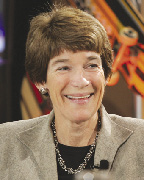Following are excerpts from the "Hotel Investments 101" chapter of the 5th Edition of Hotel Investments: Issues & Perspectives book, co-edited by Lori Raleigh and Rachel Roginsky. The book is scheduled to be published in December of 2011 by the American Hotel & Lodging Educational Institute. Several chapters from the book will be featured as part of the programming at the 2012 Americas Lodging Investment Summit.
During the past twenty plus years, hotels have been in and out of favor as an investment alternative. Understanding where we are in the investment cycle along with how and why we are where we are is a critical part of managing a hotel investment and essential for a better understanding of where the industry is headed.
Key Issues affecting the availability of Capital to the Hospitality Industry
Several factors are currently impacting the availability of capital to the hotel industry including a surplus of investment capital in general, concerns about alternative investments and the potential yield performance of hotels relative to alternative investments.
Surplus of Investment Capital
Despite the challenges in the economy and financial markets, there currently is a substantial surplus of investment capital, in large part attributable to the accumulation of both institutional pension fund and individual investment plan assets Total retirement assets in the US—including defined benefit plans (i.e. traditional employer guaranteed income retirement plans) and defined contribution plans (i.e. 401(K) employer/employee contribution savings plans) along with individual retirement accounts—currently are valued according to the Investment Company Institute at approximately $18 trillion. Given the enormous amount of pension and retirement fund capital, even seemingly minor shifts in the investment of retirement assets into or out of the hotel sector can have a significant impact on the availability of capital to the hotel industry.
HotelNewsNow has been tracking hotel investment fund activity. As of mid year 2011 there were 30 funds representing approximately $22.5 +billion in (unleveraged) equity investment capital. This represents a huge amount of investment capital relative to the overall transaction volume of $13 billion forecasted by Jones Lang LaSalle for the Americas for 2011.
Alternative Investment Performance.
The availability of capital to the hotel industry is dependent upon hotel investment return performance, in particular relative to the comparative risk versus return performance of alternative investments. As noted above during the past 20+ years the hotel industry has been in and out of favor at various times. In 1991 the US hotel industry reported negative returns at a time when an investor could earn a much higher return from a certificate of deposit with minimal or no risk. At this time hotels understandably made little economic sense as investments.
From 1991- 2000, the US hotel industry reported successive improvements in bottom line performance. With profits growing by more than $28 billion during this time frame hotels catapulted from being very undesirable to very attractive investments.
Following the events of September 11, 2001, however, (and continuing into 2002 and 2003) the hotel industry once again experienced a flight of investment capital due to the dramatic deterioration in operating fundamentals and return on investment performance.
Subsequently—during the 2004-2007 timeframe industry profits rebounded and an all time record level of $28 billion in industry profits was achieved in 2007 . During this timeframe hotels were once again in favor as an investment and the US hotel industry reported successive record breaking level sales/transaction activity -going from $15.4 billion in 2004, to $29.5 billion in 2005 to $35.3 billion in 2006 according to Real Capital Analytics.
Following the "meltdown" in the financial industry and capital markets in late 2007, 2008- 2010 proved to be extraordinarily challenging years for the hotel industry. Many hotels developed and/or purchased during the 2006/07 robust investment cycle are still in various stages of distress and being "worked out".
The forecasted improvement in operating fundamentals and net income performance combined with the the opportunity to potentially buy assets at discounts to replacement cost has -beginning in late 2010 - attracted the interest of investors. During this same timeframe the stock market has been extremely volatile and has reported a loss year to date for 2011.
The Search for Yield
Many of the acquisition funds directly or indirectly represent pension/retirement fund assets. Pension fund investment capital increasingly is focusing on yield vs capital appreciation performance to fund contingent liabilities (i.e. retirement pension fund /beneficiary obligations) and individual investors nearing retirement are also looking for yield investments to provide income for retirement. With an estimated 77 million baby boomers in the US approaching retirement age over the next several years, the search for yield can be expected to continue to be a huge issue going forward.
Shrinking Yield Alternatives. With the average dividend yield in the stock market at just over 2 percent; the 5 year treasury at .94 % and the 10 year treasury currently trading in the 2.-2.3% range investing for yield has become very challenging. Corporate debt (with an average yield of 3.7 per the Barclays Capital U.S Aggregate Bond Index) and high yield junk bonds (currently at 8.6% per the Merrill Lynch High Yield bond index) potentially offer more attractive rates but albeit with substantially great risk.
In light of the challenges of investing for yield, real estate in general and hotels in particular have once again emerged as a diversification/alternative investment for yield investors despite the overall difficult investment environment. According to the 2011 Emerging Trends in Real Estate report private direct investment in real estate was identified as having the best prospect for investment in 2011 among several asset classes including equities, investment grade bonds and commercial mortgage backed securities.
Where at in the investment cycle- Where do we go from here
Operating fundamentals for many hotels have improved in recent months and the full year forecast for 2011 according to PKF Hospitality Research's mid year Hotel Horizons report projects an industry average 13+% increase in unit level NOI (before capital reserves, rent, interest, income taxes, depreciation and amortization). Currently there remains substantial pent up investment capital demand for real estate in general and searching for yield in particular.
And thus after a lengthy period of distress (going back to the events following the financial crisis in late 2007), transaction activity in the hotel sector began to pick up midway through 2010 when according to Jones Lang LaSalle Hotels investors seeing signs of a fundamental market recovery coupled with the high level of stress in the sector began to flood back into the hospitality sector.
In late 2010 and early 2011 there was a dramatic increase in deal volume according to JLL " as investors unleashed pent up capital and equity rich buyers wasted no time to get back in the game". Transaction volume in the US for 2010 was approximately $10+ billion or nearly five times the prior year transaction activity. And for the full year 2011 JLL forecasts a substantial increase in deal volume (up to $13+ billion) with the United States expected to be one of the most active hotel transaction markets globally.".
It is important to note however that the original upbeat forecast for 2011 has been tempered in recent weeks. According to Randy Smith, co-founder and chairman of STR "The volatile market conditions have caused a growing concern among investors ...and although the hotel industry's performance seems to be holding steady, investors are apprehensive to invest and are left wondering what the rest of 2011 has in store. The global economic uncertainty will remain top of mind for investors and travelers for the remainder of the year."
Lori Raleigh is executive director at ISHC and Rachel Roginsky is a principal and co-founder of Pinnacle Advisory Group, Naples, Fl.
Tags:
Excerpt from 5th edition of Hotel Investments: Issues & Perspectives, co-edited by Raleigh and Roginsky
November 23, 2011 - Spotlights










